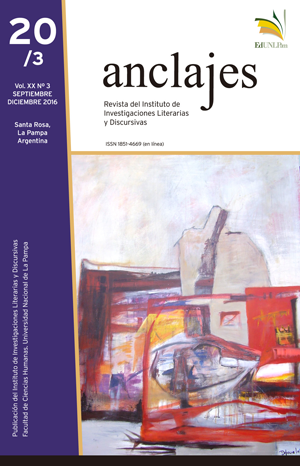Oliverio Girondo y la negación de la vanguardia
Palavras-chave:
Oliverio Girondo, literatura argentina, crítica literaria, siglo XX, ArgentinaResumo
Una hipótesis ampliamente aceptada entre críticos y aficionados afirma que Oliverio Girondo mantuvo una posición vanguardista durante toda su producción literaria. Sin embargo, en sus obras intermedias, Interlunio (1937), Persuasión de los días (1942) y Campo nuestro (1946), enmarcadas por dos momentos diferentes de vigencia de la vanguardia, los años veinte y los años cincuenta, puede leerse una suerte de huida infructuosa de la experimentación o, dicho de otro modo, la persistencia del impulso renovador de sus escritos, en un contexto de repliegue del discurso modernizador en la producción poética de la época. A partir del análisis de esas obras, este estudio muestra las vacilaciones del autor luego de los años veinte con respecto al ideal de renovación de la literatura, así como la influencia de ciertos ideales nacionalistas contrarios al internacionalismo que había sostenido en sus primeras producciones, a la vez que explica su radicalización posterior, en los tardíos cincuenta, en función del vínculo con poetas jóvenes que reivindicaron nuevamente la experimentación.
Downloads
Downloads
Publicado
Edição
Seção
Licença

Este trabalho está licenciado sob uma licença Creative Commons Attribution-NonCommercial-ShareAlike 4.0 International License.
Os autores devem aderir à licença Creative Commons 4.0 denominada “Atribución - No Comercial -CompartirIgual CC BY-NC-SA”, por meio da qual é permitido copiar, reproduzir, distribuir, comunicar publicamente o trabalho e gerar trabalhos derivados, desde e quando o autor original é citado e reconhecido. No entanto, você não tem permissão para usar o trabalho ou seus possíveis trabalhos derivados para fins comerciais. os/as autores/as devem aderir à licença Creative Commons 4.0 denominada "Atribuição - Não Comercial-CompartilhaIgual" (CC BY-NC-SA 4.0), que permite a cópia, reprodução, distribuição, comunicação pública da obra e criação de obras derivadas, desde que a autoria original seja citada e reconhecida. No entanto, não é permitido utilizar a obra nem suas possíveis obras derivadas para fins comerciais. Além disso, os/as autores/as cedem à Anclajes os direitos para a publicação de seus textos, mantendo, no entanto, sua propriedade intelectual. Isso significa que a publicação não retém os direitos de reprodução ou cópia (direitos autorais), permitindo que as pessoas responsáveis pela autoria possam disponibilizar as versões finais e divulgá-las em repositórios institucionais, temáticos, páginas pessoais na web ou qualquer outro uso relevante, desde que a fonte original de publicação seja mencionada.








.png)

2.png)















_(2).png)






.jpg)
_(1)1.jpg)



.jpg)



